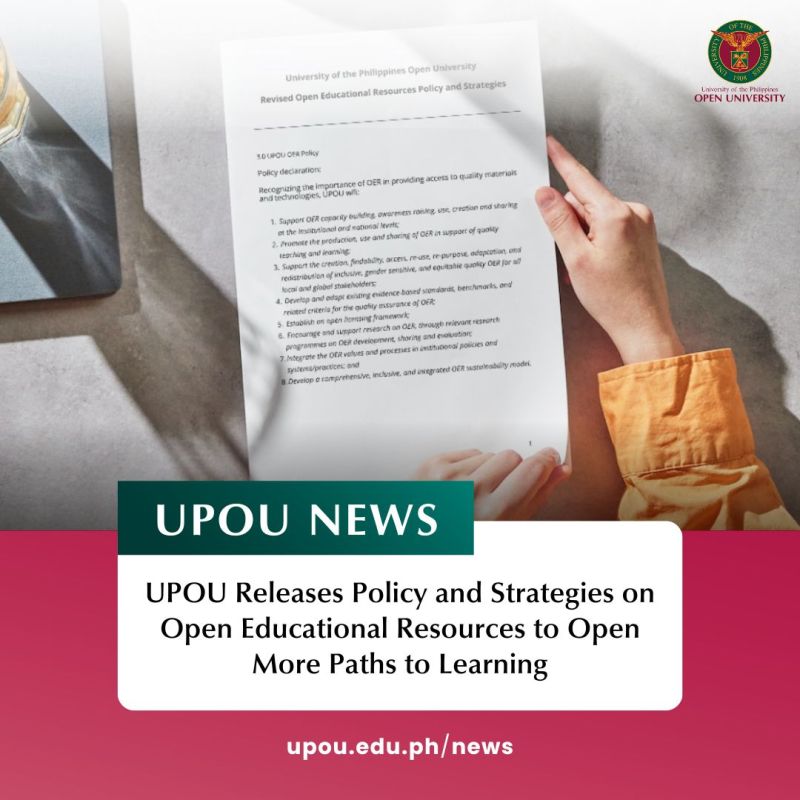
The University of the Philippines Open University (UPOU) continues to maintain its role of sharing knowledge, developing information and communications technology, designing quality learning materials, and making it accessible to the public through open educational resources (OER).
Open Educational Resources (OER) are learning, teaching, and research materials presented in any format and medium in the public domain or under the copyright that has been made available through an open license, allowing for free access, repurposing, adaptation, and redistribution by others. Since 2010, UPOU has been providing free quality learning resources.
The university advocates to foster a culture of knowledge openness and sharing.
UPOU believes utilizing OER would pave the way for more efficient development of quality teaching and learning materials. Recognizing the importance of OER in providing access to quality materials and technologies, UPOU released the UPOU OER Policy and Strategies containing a declaration that UPOU will:
- Support OER capacity building, awareness raising, use, creation, and sharing at the institutional and national levels;
- Promote OER’s production, use, and sharing in support of quality teaching and learning;
- Support the creation, findability, access, re-use, repurpose, adaptation, and redistribution of inclusive, gender-sensitive, and equitable quality OER for all local and global stakeholders;
- Develop and adapt existing evidence-based standards, benchmarks, and related criteria for the quality assurance of OER.
- Establish an open licensing framework;
- Encourage and support research on OER through relevant research programs on OER development, sharing, and evaluation;
- Integrate the OER values and processes in institutional policies and systems/practices; and
- Develop a comprehensive, inclusive, and integrated OER sustainability model.
The full document of UPOU OER’s policy and strategies is available on the UPOU website and can be accessed through this link.
UPOU Networks
UPOU Networks is the online repository of UPOU’s produced multimedia resources. It has five (5) main features – UPOU Commons, UPOU Publications, UPOU Live, UPOU On Record, and UPOU Featured Program. UPOU Commons is the central archive for the OERs that the university produces. UPOU Publications is the archive for the UPOU-produced journals and publications that are OERs with Creative Commons license. UPOU Live is a section where lectures, fora, research presentations, seminars, and other university events are livestreamed. UPOU On Record serves as the internet radio and repository of UPOU-produced broadcasts. The UPOU Featured Program presents UPOU program offerings on a bi-weekly basis.
UPOU Networks offers resources from various subjects ranging from agriculture, environment & natural resources, ASEAN studies, arts and multimedia, business analytics, cybersecurity and data privacy, education, entrepreneurship, gender, health sciences, ICT, language and communication, management, mathematics, natural sciences, open and distance eLearning (ODeL), research, social sciences, statistics, and technology for teaching and learning.
In 2023, the university produced 93 new OERs in video format and 93 audio material or podcast versions of the videos. In total, UPOU has 1,453 OERs that are available for public use. UPOU Networks also had an increase of 110,200 new users, making its total users 615,457.
The UPOU Networks allows university stakeholders to access extensive information across various media platforms. It also acts as the university’s window to the outside world, where real-time social interaction occurs. UPOU Multimedia Center is in charge of overseeing the website.
The institution’s relentless development of UPOU Networks and OER reflects its commitment to enhancing global education and empowering students, teachers, and stakeholders everywhere. The university will continue to develop and improve OER to benefit more learners and make a real difference in shaping the future of education by promoting inclusivity, accessibility, and quality in their learning experience.
Through the UPOU Networks, UPOU OERs can be accessed online anytime, anywhere. Learn more about OER and be able to use open and quality learning resources for your academic endeavors by visiting UPOU Networks at networks.upou.edu.ph.
Written by Zyrene Edrei Villanueva ♦ Edited by Myra C. Almodiel and Anna Cañas-Llamas








